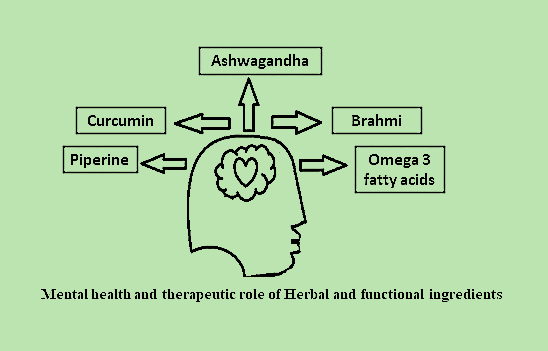Sectional study of nutritional psychology to identify the significance of the connection between mental health and nutraceutical functional ingredients
چکیده
An individual’s good health is often linked to a well-balanced mind, as stated in a famous quote that highlights the impact of the mind on one’s overall well-being. The primary goal of this study is to delve deeper into the field of nutritional psychology and functional food ingredients and examine their potential positive impact on mental health. However, the scope of the study is restricted to only five ingredients that have been highly recommended for treating mental health issues. To write this narrative research, we focused on creating comprehensive analysis and review articles. After conducting a thorough literature survey, we assessed the herbal and functional food ingredients commonly used to alleviate psychiatric symptoms or disorders. The most significant findings were related to Omega-3 fatty acids, Bacopa monnieri from Brahmi, Withaniasomnifera from Ashwagandha, Curcumin from turmeric (Curcuma longa) and Piperine from black pepper. The anti-inflammatory and antioxidant properties of these foods showed positive results in preventing and treating mental health problems. Additionally, these foods can promote cell generation in the body. Neurotransmitters such as acetylcholine and monoamines saw significant improvements with the intake of these foods. Hence, it is evident that incorporating these foods into our diet and utilizing them for the development of drugs and nutraceuticals in the foreseeable future can assist in treating various psychiatric issues.

Keywords: Herbal andFunctional foods, Mental health, Nutraceutical Ingredients, Nutritional psychology, etc
چاپ شده
شماره
نوع مقاله
مجوز
Any manuscripts or substantial parts of it, submitted to the journal must not be under consideration by or previously published in any other journal or citable form. Authors are required to ensure that no material submitted as part of a manuscript infringes existing copyrights or the rights of a third party. In submitting one's article in any form, the author has assigned the FFC publishing rights and has agreed to an automatic transfer of the copyright to the publisher. This is so that the FFC may create print option journals, for example, at the FFC’s discretion. If the author wishes to distribute their works by means outside of the FFC, for example within their community, they will have to place a request.
Correspondence concerning articles published in Functional Foods in Health and Disease is encouraged. While derivative works (adaptations, extensions on the current work, etc.) are allowed, distribution of the modified material is not allowed without permission from the FFC.